Peter MALONE
Saturday, 18 September 2021 19:57
Serving Sara
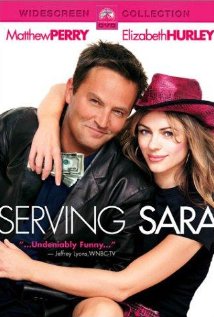
SERVING SARA
US, 2002, and 99 minutes, Colour.
Matthew Perry, Elizabeth Hurley, Vincent Pastore, Bruce Campbell, Cedric the Entertainer, Amy Adams, Terry Crews, Jerry Stiller.
Directed by Reginald Hudlin.
Serving Sara is a romantic comedy, capitalising on the popularity of Matthew Perry and his long television presence on Friends, as well as of British model, Elizabeth Hurley. The husband is The Evil Dead’s Bruce Campbell. The supporting cast includes Cedric the Entertainer in an early film as well as a surprise with Amy Adams as the calculating girlfriend – and it is she who has had the most successful career. There is a comic interlude with Jerry Stiller as a venal policeman.
The title indicates that Matthew Perry’s character, Joe, serves summonses, employed by Cedric the Entertainer, with Vincent Pastore as his rival, undermining his work by word warning people against him in advance. While he tries to serve Sara, the tables are turned as she does a deal with him as he suggests serving her husband in Texas. This means a shift of locations, the wide open spaces in Texas, the ranches, an extended comic interlude where Matthew Perry pretends to be a vet and has to stimulate a bull for a semen specimen.
On the whole, while the film is entertaining on screen, it is fairly slight.
1. A romantic comedy for thirtysomethings? Divorce, infidelity, the law?
2. A New York story, atmosphere, Mafia connections, wealthy mansions, floor offices? The contrast with Texas, the city, the hotels, the ranches and properties? Musical score?
3. The cast, from television, British, Amy Adams coming up…?
4. Matthew Perry as Joe, the background of Friends? His story of being a lawyer, serving the papers, with the Mafia connections, the confrontation, his confidence, later being bashed? Ray as his employer, the different jobs, Tony and the rivalry, Tony and his undermining Joe’s work?
5. The title, the big job, the money? Tony and his exasperation? Phoning and warning? Sara, her personality, her relationship with her husband, in New York, Joe and intruding into the house, Sara and her avoiding him?
6. Sara’s husband, with her? Then with his girlfriend? The girlfriend’s attitude, a golddigger, the husband selling his property, her wanting a settlement, his lawyer and the warnings? The girlfriend and the setup, her tricking Joe?
7. Joe and Sara, the change of idea, the bargain, the note, offering him $1 million? Joe and dealing with the policeman, information and bribes? his feeding the false information to Tony, Tony going to Florida, to Maine, to Dallas?
8. The couple arriving in Dallas, the setup for the husband, Sara and anger, the warning, his getting away, further complications and adventures?
9. At the hotel, the demarcation on the bed, the sympathy between the two? On the road, going to the farm, seeing the husband and his wanting to sell
the property, Joe and his pretending to be the vet, the issue with the bull, the comedy of his getting the sample, the aftermath?
10. The husband, getting the tough man on the case, the pursuit?
11. Ray, the complications, rainy New York, the phone calls from Joe, the phone calls to Tony? Thinking that everything was settled – and the issue of the time difference?
12. Joe, the clash with Sara, the girlfriend in the bar, doing the deal with Joe, his being tricked?
13. Going to the stock car event, the crashes, the husband and the notice on the screen about his infection, everybody feeling, isolating him, and his continued concern about his hat?
14. Tony, the tough, their crashing and being carried out?
15. The happy ending – romantic ending?
Published in Movie Reviews
Published in
Movie Reviews
Tagged under
Saturday, 18 September 2021 19:57
Make Mine Laughs
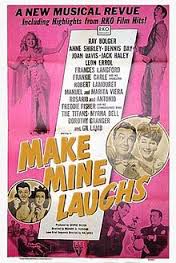
MAKE MINE LAUGHS
US, 1949, 63 minutes, Black and white.
Gill Lamb, Leon Errol, archival footage: Joan Davis, Ray Bolger, Dennis Day, Ann Shirley, Frances Langford, Jack Haley.
Directed by Richard O. Fleischer and Hal Yates.
This is a film of historical interest – or even antiquarian interest.
While it has some original footage, especially with master of ceremonies, Gil Lamb, who makes a great deal of indicating the opening credits as well as introducing the different acts, and with Leon Errol in an extended comic piece with him as a philanderer deceiving his wife, carrying on with a girl, and her husband turning up.
Otherwise, in tribute to the days of vaudeville, already by 1949 something of the past, there are comic sketches by Joan Davis and Jack Haley, a song by Frances Langford, dancing sequence from Ray Bolger, a number of song and dance routines as well as some bands.
Interesting to see Ray Bolger and Jack Haley 10 years after The Wizard of Oz, popular singers Denis Day and Frances Langford and the comic versatility, including sound impressions, by Joan Davis.
Published in Movie Reviews
Published in
Movie Reviews
Tagged under
Saturday, 18 September 2021 19:57
Eddy Duchin Story, The
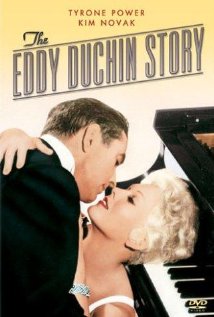
THE EDDY DUCHIN STORY
US, 1956, 123 minutes, Colour.
Tyrone Power, Kim Novak, Victoria Shaw, James Whitmore, Rex Thompson, Shepperd Strudwick, Frieda Inescourt, Larry Keating.
Directed by George Sidney.
The Eddy Duchin Story is a lavish biography of pianist, Eddy Duchin who went from Boston to New York City in the late 1920s and became a celebrity pianist for upmarket venues, also touring during the 1930s.
This film was made in widescreen and colour, quite impressive for a Columbia production, but directed by George Sidney, and who had made his mark in the previous decade with musicals and dramas at MGM. While Duchin was not so well known, it is surprising to find that he died just five years before this film was released.
The soundtrack does not use Duchin’s own music. Rather pianist Carmen Cavalero doesas all the playing – but Tyrone Power allegedly worked very hard at the fingering for the performance and it would seem that he is definitely playing. He portrays Duchin as an enthusiast, confident in his gift for music, falling in love with the interior decorator, Marjorie (a pleasing performance from Kim Novak), marrying her but suffering with her death soon after giving birth to their son, the later musician, Peter. While Duchin is away, especially serving in the Navy during the war, Peter is brought up by his uncle and aunt, here called the Wadsworth but, in reality, statesman Avril Harriman and his wife. His Nanny is played by Victoria Shaw (Australia’s Jeanette Elphick) whom Duchin their eventually marries but dies young from leukemia.
James Whitmore gives yet another of his pleasant performances as Duchin’s manager.
1. Eddy Duchin and his reputation as pianist during the 1930s and 1940s? The film as biography, portrait, tribute? The film made so soon after his death?
2. The musical biographies of the 1950s, Colombia and its production values, New York locations, casinos, clubs, apartments, mentions? The world of affluence?
3. The musical score, Carmen Cavallero and his performances, Tyrone Power and his expert fingering and performance? The range of songs, musical compositions, improvisation’s, Duchin’s particular style?
4. The background of his family, his parents in Boston, their hard work, his meeting Reisman, the encouragement, leaving everything in Boston, coming to New York, eager, meeting Reisman and Lou, his misinterpreting their encouragement? Dismayed, the open piano, Marjorie hearing him, the attraction, having a regiment? Asking for music throughout the whole evening, his being invited to play, during the meal, the intermission, Marjorie getting people to dance? Friendship with Lou, the tuxedo, his excitement and not keeping quiet?
5. Reisman and his encouragement, having two pianists, the collage of Eddy’s playing, the one piano, fame, fans? His playing to New York’s elite, the wealthy?
6. Marjorie, her character, interior decorator, her relationship with her uncle and aunt, living with them? Eddy and his going to the party, thinking he had been invited, being asked to play, his angry response? Feeling the class distinction?
7. Marjorie, his going out with her, falling in love, his continuing to play, people responding, dancing? His parents, their pride, the meeting with Marjorie? His proposal? The wedding?
8. The happy couple, his continued success, her pregnancy? Her fear of the wind? Going to hospital, the prognosis of her illness? The Wadsworth’s calling Eddy? His being with his wife, the talk, the promises, her death? The funeral?
9. Eddy and his inability to see his son? Touring, the support of Lou? Sending gifts to his son? The Wadsworths caring for him? Eddy coming to see him, the awkwardness, the formal handshake, the day out? Thanking Eddy for the balloon? The care by the Wadsworths? Chiquita, her own background, England, the death of her parents in the blitz, looking after Peter?
10. Eddy, enlisting, his naval service, his wanting action rather than morale-boosting entertainment? In the Philippines, the piano, his playing, the young boy with him, the affection? The end of the war?
11. Lou’s straight talking, Eddy going back to New York, the job? The irony of the casino pulled down and a children’s playground in its stead? His going to see Peter, going out, the tension between the two? Chiquita, her personality, strong talk to Eddy?
12. The gradual mellowing, Peter going to school, coming to the rehearsals, playing the piano, his friends and the instruments? His father playing with him? A growing pride, affection, love?
13. Eddy, dependence on Chiquita, affection for her, the proposal?
14. Performance, the leukaemia, his hands, saying nothing was wrong, Lou and his urgings? The different doctors? The diagnosis, short time to live? His taking Peter to say that he would have to go, eventually explaining his death?
15. A sympathetic portrait, Eddy Duchin as a character, love for Marjorie, learning love to his son, devotion to Chiquita? His talent for the piano and for entertaining?
Published in Movie Reviews
Published in
Movie Reviews
Tagged under
Saturday, 18 September 2021 19:57
We are Your Friends
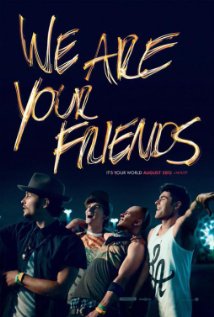
WE ARE YOUR FRIENDS
US, 2015, 96 minutes, Colour.
Zac Efron, Wes Bentley, Emily Ratajkowski, Jonny Weston, Shiloh Fernandez, Alex Shaffer, John Bernthal.
Directed by Max Joseph.
This is a film for a generation in its 20s. Older audiences might find it difficult to identify with, some remembering their past and realising they have well moved on, others not finding the characters or the situation congenial. The screenplay has lines such as a description of those who participated in the parties, with the music, drugs, drink, sexual behaviour, as “gyrating tweens”. One of the characters, in his early 40s, also remarks that at 23 a person has not lived long enough to learn the meaning of ‘irreparable’! And also asserts that a person has not become themselves until age 27.
The central characters of this film, the four friends, a not yet 27!
For some times, there have been many fifth a reference to the Valley Girls from the San Fernando Valley of Los Angeles. While there are some Valley Girls here, this is a story about four Valley Boys. At this stage of their life, they don’t have any full-time jobs, are on the lookout - sometimes, but more involved in promoting music and parties and, one or other of them, dealing drugs.
The central character is Cole, a young DJ, or with ambitions to become a DJ, played by Zac Efron, who, after his High School Musical escapades, has had the opportunity to appear in quite a number of serious films. This one is in between.
His other friends include Mason (Jonny Weston), a carefree type, helping with some building work, enthusiastic about party promotions. Then there is Ollie (Shiloh Fernandez) wanting to be an actor, but more interested in dealing drugs. Then there is Squirrel (Alex Shaffer), the rather put-upon member of the group. At one stage, there might be an improvement with work in the office of one of the drug clients, a company which allegedly helps those in difficulty with home finances but is really exploitative, wants to get homes for a cut-price and then selling them off while promising to rent them to the previous tenants. The four work in the company but, eventually, it gets to Cole, especially as he visits a woman with her child and realises that she is the victim of a scam.
The other track of the story is Cole’s encounter with James, Wes Bentley, a 40 something DJ who has a strong international reputation, who takes a shine to Cole, gives him a lot of advice, helps him with his tracks, advises him to listen and hear rather than just simply rely on possibilities from his laptop. But, there is no plain sailing, because Cole is attracted to James’s girlfriend and Personal Assistant, Sophie (Emily Ratajkowski).
There are some grim moments in the film, especially a drug overdose death which challenges the group. And, after the first hour or so of seeming indulgence in hedonism, the screenplay starts to take a moralising tone, which means that by the end, Cole has to make some decisions about life, what he wants, positive aims, and capitalising on his musical talent.
Perhaps this review makes the film sound more interesting than it is except for its target audience.
1. The target audience? Young men and women in their 20s? (And the reference to “gyrating tweens”)?
2. The San Fernando Valley, the boys of the Valley, the girls of the Valley? Life, family, age, jobs or no jobs, music, drinking, drugs, parties, sex? Indulging in hedonism? Aims and aimlessness?
3. Moralising story – after one hour into the film? The initial focus on self to focus on self-awareness? Consequences, challenge, change? Decisions? Real aims?
4. The title, the four friends, the explanation? The would-be actor and his drugs? The group promoting nightclubs? Cole as a DJ? The bonds throughout the film, shared parties, friends, work? The effect of Squirrel’s death? The break? Re-examining their lives?
5. The focus on Cole, the narrator, his ambitions as a DJ, his music, tracks, working on the laptop, the different compositions? Being urged by James to listen and to hear? Music and ordinary sounds? Cole as a person, his friends, the promotion, sharing with his friends, the work at the estate agency? Encounter with James, going to the party, the drugs, his psychedelic visual experience? Meeting Sophie? Waking up, the friendship with James? The music, James and his lessons, trust, encouragement? Going to Las Vegas, with Sophie, the night with her? With James, the tension with the birthday cake, going to the party, James finding Cole’s phone, Cole sick, the clash between the two? The job at the estate agency, the phone calls, Mrs Romero and her situation, with her son, the house? The work for Paige, his contacts, the drugs? The visiting of Mrs Romero, Paige and his scam? His plan to re-sell the house instead of renting? Deceiving Mrs Romero? The new house, Mason renting it, the party, excess, Squirrel’s death, their being jolted? The funeral? Cole and his change, jogging, listening to the sounds, his new track, confronting James, going to the Festival, performance, success? Going to see Sophie, the pie? Leaving the money for Mrs Romero?
6. The sketches of the friends, Squirrel, follower, at work, regrets, his death? Ollie, wanting to act, dealing with the drugs, the work, his angers with the others, deciding to stay with the agency? Yet his going to an audition? Mason, carefree, friendship with Cole, their working on the roof, parties, promotion, drugs? Having to settle down?
7. James, older, his past career, success as a DJ, international, his drinking, the parties, the relationship with Sophie, her working as his assistant, friendship with Cole, helping him, advice? Personal disillusionment? The break with Sophie? Supporting Cole at the end?
8. Sophie, dropping out of college, music, drugs, the relationship with James, becoming his personal system, the bookings, going to Las Vegas with Cole, the night? Wanting to move on? The cake, her anger, going to the cafe, the promise of pie? With Cole at the end?
9. Paige, parties, girls, drugs? Inviting the group to work? His explanation of the schemes? Deceiving Mrs Romero? Cole’s challenge to him?
10. The absence of adult figures in the film?
11. The crowds, gyrating tweens? The repetition of the phrase “I can do better”? James’s comment, “at 23, you haven’t had time to learn the meaning of irreparable”? His comment that no one was a person until age 27?
Published in Movie Reviews
Published in
Movie Reviews
Tagged under
Saturday, 18 September 2021 19:57
Little Boy
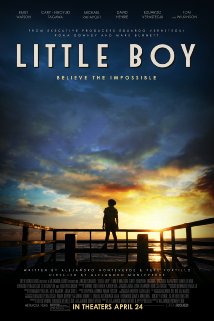
LITTLE BOY
US, 2015, 96 minutes, Colour.
Jakob Salvati, Emily Watson, Michael Rapaport, David Henrie Tom Wilkinson, Cary- Hirojuki Tagawa, Ted Levine, Ben Chaplin, Eduardo Verastegui.
Directed by Alejandro Monteverde.
Little boy is a nickname for the central character in this family-oriented film, a film of values with touches of religion. It is set in the town of O’ Hare in California in the first half of the 1940s, the time of the US involvement in World War II, post-Pearl Harbor, the hostility towards Japanese rounded up and interned. Little Boy is also the nickname for one of the atomic bombs that was dropped on Hiroshima in order to end the war.
This is very traditional filmmaking, the kind of filmmaking that was very popular in past decades, pleasing and accessible filmmaking, which critics and many in younger generations dismiss as “uninventive”. Be that as it may, this is a film which will appeal to audiences who are looking for a warm and interesting story, sympathetic characters, an acknowledgement of conflict, who want some kind of hope, even prayer and miracles. Since the popularity of The Passion of the Christ in the United States in 2004, American companies have been far more confident in making films geared to the middle American audience, offering films of faith. While some of them may seem too American and their style of sentiment for audiences outside the US, this one will probably have more general appeal.
Audiences in 2007 were charmed by small-budget film with Hispanic characters, Bella. This film is from the same director, Aleyandro Monteverde. He brings the same sentiment to this film, a touch of the fanciful, a touch of the romantic, more than a touch of the hopeful.
It is well served by the young Jakob Salvati playing the eight-year-old boy in the town of O’ Hare, Pepper. Salvati is one of those screen presences who is often described as cute and appealing. And he is, able to sustain the whole drama. He is very short, Little Boy, bullied by the big kids in the town. But, he has a very close relationship with his father, shared imagination storytelling, delighting in the comic books of Black Eagle, especially enjoying a live performance at the local cinema when Black Eagle comes to town and Pepper is invited on stage and invited to will the movement of a bottle.
He does, and this leads to a religious theme, the quotation from the gospel about having faith the size of a mustard seed and being able to move mountains. There are two priests in the parish and the parish priest, Father Oliver (a sympathetic Tom Wilkinson) reflects on faith and prayer with Pepper, giving him a list of good things to do, Gospel-based, visiting the sick, feeding hungry, clothing the naked (and his being involved in a knitting bee for those without clothes). It is a pity that there is not more explicit explanation of where these injunctions come from, from the Gospel of St Matthew, but they are general enough to appeal to any person of good faith who is not necessarily Christian.
Not sharing this faith is an elderly Japanese man, Mr Hashimoto, released from internment, returning to O’ Hare but the subject of disdain, enmity and, often, violence. The parish priest adds visiting Mr Hashimoto to Peppers list, not something easy because Pepper has been involved with his angry older brother and pelting the Japanese man’s house with stones. But, gradually, they form a bond.
There are flashes to the involvement of Pepper’s father in battles in the Philippines, and his being a prisoner of war, with the Japanese guards shooting at the Americans at the time of the dropping of the bomb, Little Boy, on Hiroshima, something which Pepper sees on the newsreels and dreams about, wandering about the ruins of the city.
While Jacob Salvati is very effective as Pepper, Emily Watson brings her warmth to the role of the mother and comedian Kevin James has a small role as the local doctor. Michael Rapaport is the father and Ben Chaplin is Black Eagle.
Of course, there is a great deal of sentiment in the film, but, unfortunately, this often gives rise to a certain cynical response to such human warmth, which is a pity.
A pleasing, traditional, pleasant and sometimes challenging re-visiting of California during World War II.
1. The target audience for this film? Traditional audiences? The family? Audiences for values, religious themes?
2. The tone, filming? The 1940s, the small town, homes, the sea, the garage, shops, the church, hospital? The cinema and the titles on the awning? Audiences identifying with characters and situations? The musical score?
3. The title, the local paper? The phone for the atomic bomb? The spread, yet the limits of destruction?
4. The adult voiceover, remembering, admiration for? The folksy tone?
5. The style of filmmaking, traditional, policeman, available to a wide audience, the religious dimension?
6. Pepper, his birth, small, measuring his height? The doctor and the possibility of his dwarfism? His nickname? Freddy and the boys in the town, the bullying, the fights, the chases? His older brother, London? His mother, her care? London, signing up, his flat feet, rejection? The father going in his stead, leaving, Pepper and his tears, holding on to his father’s leg?
7. The bond between father and son, the stories, the adventures of Black Eagle, imagining them, the pirates, the cliffhanger…? The comic books? the saying that everything was possible?
8. Pepper and his life after his father went to war, helping, Teacup and his work, London and his anger, getting the money, buying the boots, and chased by the bullies? Wearing the boots? Keeping them until his father’s return?
9. The end, kids’ cruelty, the taunts, the fights?
10. The doctor, kindness, the bullying son, his dead wife, the visits to Pepper’s mother, the attraction, the visit for dinner?
11. Black Eagle, the cinema, the glimpse from the serial, live action, on stage, invitation to Pepper on stage, to move the bottle, everybody laughing, his efforts, the movement, reactions?
12. Fr Crispin, his sermon, faith and the mustard seed, going to confession, the penance, the nun helping, saying the Hail Mary’s in Latin? Fr Oliver, the discussions about prayer, faith, with the actual mustard seed? Trying to move the bottle, Fr Oliver moving it, because Pepper wanted it to be moved? Giving him the list, good deeds – no explicit explanation of the injunctions from the gospel?
13. The Japanese, the hostility in California, the newsreels, footage and Pepper’s father’s action in the Philippines? The Japanese interns released because of their loyalty? Mr Hashimoto, his place in the town, his house, as a person, 42 years in America, his home, the photos? The hostility from London and from Pepper, throwing the stones, the discussions with Fr Oliver, and adding visits to Mr Hashimoto to the list?
14. The encounters with Mr Hashimoto, the apology, leaving the soda and Mr Hashimoto putting it in the bin, hanging out, the ice cream, the store refusing to serve the Japanese, sitting outside with the ice cream, Pepper being rescued from the bullying boys, the bond between the two, talking, the list and getting advice for the different elements of the list? Mr Hashimoto and his talking with Pepper the Samurai stories being visualised – and Pepper putting them into action in hitting Freddy? The reaction of the kids?
15. Discussions about prayer, Mr Hashimoto and Fr Olivers friend up there, the importance of belief in self? Pointing out Japan in the direction of the sunset?
16. Pepper, fulfilling the items on the list, visiting the wounded man in hospital with Mr Hashimoto, Teacup as homeless, care for the sick, going to prison to see his brother, knitting the clothes with the women…?
17. Pepper, his decision to move the mountain, his face, his yelling out, the earthquake, the newspaper headings, people’s reactions? Fr Oliver’s explanation?
18. The flashbacks to Pepper’s father, the Japanese, prisoner of war labour, wounded, the soldier stealing his boots, with the tags, shot, the wrong identification?
19. The bombing of Hiroshima, the newsreel footage, Pepper and his dream, walking among the rubble, the burned people, discovering the bomby had the same name Little Boy?
20. The invitation to Mr Hashimoto for dinner, his mother’s welcome, London and his reaction, his going to the house with the angry man whose son had been killed, the brutality of the bashing, London going to help him, Mr Hashimoto in hospital, London in prison, the doctor helping for his release? Pepper’s mother not responding to the doctor?
21. The news of the death, the sadness, the memorial service, Mr Hashimoto recovering, present?
22. The news of the father’s survival, joy, the prayer and miracles? The father’s return, at the hospital, the happy reunion?
Published in Movie Reviews
Published in
Movie Reviews
Tagged under
Saturday, 18 September 2021 19:57
Female
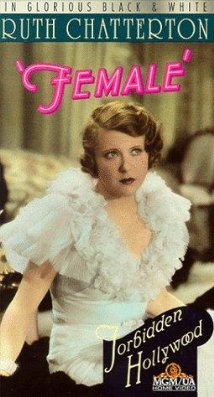
FEMALE
US 1933, 60 minutes, Black and white.
Ruth Chatterton, George Brent, Lois Wilson, Johnny Mack Brown, Ruth Donnelly, Ferdinand Gottschalk.
Directed by Michael Curtiz.
Female is a brief film from Warner Brothers in the early 1930s.It is a star vehicle for Ruth Chatterton and an early performance from George Brent. There are the usual touches from Ruth Donnelly and Ferdinand Gottschalk as an advisor in a rather ambiguously sinister performance.
From the title, it seems like a pioneer film in feminism. Ruth Chatterton plays the manager of a car building firm, inherited from her father, very efficient in management, seeming cold to those she works with, but enjoying the thrill of business action. She has a low opinion of men and decides that she would act like a man, especially in terms of relationships with men in the office, inviting them to dinner at home, being somewhat seductive, and then ignoring them or moving them on.
A crisis comes when she encounters an inventor, played by George Brent, at a shooting gallery – and he doesn’t know who she is, and surprised when he finds her running the company. There are discussions about her role as a woman, the place of family, love and romance. There is also discussion of dominant men wanting to protect women, the status quo.
Ultimately, perhaps because this is the 1930s, the woman decides that she will opt for love, out of the business, relying on the man with whom she has fallen in love. Interesting views of the feminism of the time. The film was directed by Michael Curtiz, directing small firms at Warner Brothers then moving into many significant films including Captain Blood, The Charge of the Light Brigade…
1. The title, expectations, the status of women, 1930s, the women’s movement, traditional ideas, in business, at home, families and children? The perspective of the feminism?
2. Black-and-white photography, the car the plant, offices, mansions, the clubs and outings, the ride to New York City? The musical score?
3. The brief plot, the focus on Alison, inheriting the company from father, her management, the meetings, brusque, decisions, phone calls, meetings? Wanting better promotion? The company and its difficulties? Audience response to her as the manager of the company, in the 1930s – and the comments about her withdrawing and going to make a family?
4. Alison, deciding to act like a man in business, the men and the attraction towards her, her inviting them home, her clothes, the vodka, the cautions, the touch of the seductive, swimming, suggestions of relationship, sending them home, ignoring them after or transferring them?
5. The relationship with Pettigrew, his advice, seeming sinister, even lewd? His attraction towards Miss Frothingham and the touch of suggestiveness?
6. Alison, her friend arriving, memories of the past, Harriet and her family, the welcome, the dinner, the comparison?
7. The decision to hire Thorne, to break his contract, the automatic gear?
8. Alison, wanting to be anonymous, the carnival, the shooting gallery, the encounter with Thorne, the shooting gallery, his spending the evening with her, seeing her as a pickup? His surprise to find that she was the boss? Her inviting him to the house, his wanting to do business, trying to be seductive, his not responding? The picnic, the tricking him, a happy afternoon, his misinterpretation, the marriage license, her reaction? His leaving?
9. The board meeting, indecision, her going in pursuit, the drive, the gallery, going to New York, the shooting, her decision and discussions about being a wife and mother, managing the factory with him, the image of the dominant male and the submissive female?
10. The film in light of the attitudes of the times, towards women? In later decades?
Published in Movie Reviews
Published in
Movie Reviews
Tagged under
Saturday, 18 September 2021 19:57
Bordertown/ 1936
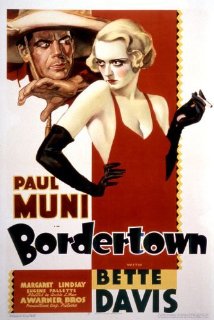
BORDERTOWN
US, 1935, 90 minutes, Black-and-white.
Paul Muni, Bette Davis, Margaret Lindsay, Eugene Pallette, Robert Barrat, Soldedad Jimenez.
Directed by Archie L. Mayo.
Bordertown is one of the many dramas starring Paul Muni at Warner Brothers during the 1930s. By this time he had appeared in Scarface as well as I Was a Fugitive from a Chain Gang. He was soon to appear in The Story of Louis Pasteur and win an Oscar, as well as biographies of Emile Zola and Juarez. He had a distinctive screen presence, immersing himself in the characteristics of his roles.
He portrays Johnny Ramirez, a young man, with a rough background in the Mexican sector of LA, educating himself as a lawyer but failing in his first case, defending a poor Hispanic man whose truck was hit by a white woman who was drunk. After being reprimanded by the judge, he decides to give up the law, especially against the advice of the priest (Robert Barrat) who had supported him and his mother. He goes to the American Mexican border, a town like Tijuana, with clubs and restaurants, showing his effectiveness as a manager, the owner of the club, Eugene Pallette, relying on him and his wife, Bette Davis, attracted to him.
There are complications in the selling of the club, rebuilding it to be a star attraction for the wealthy, the wife killing her husband, pursuing Johnny, jealous of his attraction towards a white woman, Margaret Lindsay, and accusing him of murder. When he is freed, he is also rebuffed by the woman, on racial and cultural grounds, and has something of a conversion experience, planning to donate his money to establish a Law Institute for his people.
Very interesting in terms of perceptions of racial themes, Hispanics in Los Angeles, the towns on the border, the superiority of the whites over Hispanics.
1. The tough Warner Brothers drama from the mid 1930s? Social issues? Race issues? Hispanic issues?
2. Los Angeles settings, the Mexican part of the city? Homes, church, adult education? The law? The contrast with the Bordertown, Hispanic atmosphere, restaurants and clubs, wealthy mansions? Musical score?
3. The story of Johnny Ramirez? Paul Muni and his screen presence? The opening, five years of studying law, working in the garage, his graduation, his mother’s joy, the priest, the multicultural graduates and the encouraging speech? Johnny’s practice, his mother’s sign, not getting any business, the old man and fixing his truck, the crash into the truck, going to court, his not being well prepared, the reprimands of the judge, Dell and her sketch, the prosecutor and his criticisms, objections, allowing him not to pay the fine? The demands of the judge? His rough background? His temper?
4. Going to the priest, not listening to his advice, the warning about life and getting money? His determination?
5. His going to Bordertown, working as the manager of the club, the explanation of his arrival, his skills, good management? Roark and his reliance on Johnny? Selling the club or not? Marie and her marriage, her fascination with Johnny, her husband going to Los Angeles, his new teeth, her exasperation, his drinking, shutting garage door and his death? Her behaviour, the testimony to the police, being exonerated? Her still pursuing Johnny?
6. Johnny, the determination to build the new club, pressure on the builders? Marie and her providing the money? Her anger at his ignoring her? Telling him that she killed her husband? His reaction?
7. The opening, the guests, Dell and the lawyer, Johnny welcoming them, the attraction to Dell? Dancing with her? Marie arriving, the jealousy? Johnny and his going to Los Angeles, outings with Dell, her family gathering, the racial differences and her saying he was a savage? The break?
8. Marie accusing him of murder, in the court, her breakdown and testimony, his freedom?
9. The return home, his mother, talking with the priest, confession, advice, the bequest to set up of the Institute?
10. The story of redemption?
Published in Movie Reviews
Published in
Movie Reviews
Tagged under
Saturday, 18 September 2021 19:57
Palm Springs Weekend
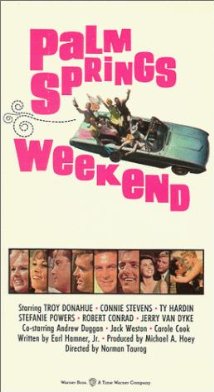
PALM SPRINGS WEEKEND
US, 1963, 100 minutes, Colour.
Troy Donohue, Connie Stevens, Ty Hardin, Stefanie Powers, Robert Conrad, Andrew Duggan, Jack Weston, Carole Cooke, Jerry Van Dyke, Zeem North, Bill Mumy.
Directed by Norman Taurog.
Palm Springs Weekend is a star vehicle for Troy Donohue, very popular at Warner Brothers at this period, especially for his presence in such films as Parrish, Susan Slade (both co-starring Connie Francis). It is also a star vehicle for up-and-coming performers like Stefanie Powers, Robert Conrad in a rather sinister role, Ty Hardin in a sympathetic role as a stuntman from Hollywood. There is serious support from Andrew Duggan as the police chief of Palm Springs, some comedy with Jack Weston as the basketball coach becoming entangled with the manager of a motel, Carole Cooke, some comedy with Jerry Van Dyke and Zeem North, babysitter for the very mischievous Bill Mumy (later, Lost in Space).
The basic plot is very familiar – and, even though the young people get in trouble with the police, and there is drinking and some sexual hanky-panky, it seems rather restrained, also in language, from the type of Spring Break films which were to emerge in the 1980s and continue from then on, raucous films, showing students leaving their brains behind them and indulging in raucous and raunchy behaviour.
Troy Donohue is one of the members of a Los Angeles basketball team who decide to take a break in Palm Springs, only to find that their coach is along with them, trying to control them. Also on the bus is a young girl, Connie Stevens, pretending to be wealthy and to be educated in Hawaii, with the hope that she will attract attention. She does attract the attention of the wealthy playboy, played by Robert Conrad, who attempts to lead her astray, is in angry reaction against his wealthy father and his continually being on honeymoons and out of contact, paying for a night out for the young people, pursuing Connie Stevens but her resisting him, with his finishing up doing a drag race with tie Hardin leading to Hardin crashing – but being rescued by Troy Donohue. The young man was trying to embarrass his father.
With this subplot, the rest is fairly straightforward, with Stefanie Powers the daughter of the police chief, going to a party, getting arrested when a brawl breaks out and going to jail where her father interviews everyone. He is uptight, his wife putting sedatives in his orange juice, and his taking a grim stance towards Troy Donohue who but then finds out the truth and his saving of Ty Hardin’s life.
There is comedy with Jack Weston and Carole Cooke at the motel, comedy with Zeem North and Jerry Van Dyke as she babysits the motel manager’s troublesome son, who gets into all kinds of mischief, including pushing people into the motel swimming pool, especially with detergent which creates an enormous amount of foam with people misjudging their step and finishing up in the foam in pool.
The film seems rather dated in retrospect, but is an indication, along with the very similar themed films Where the Boys Are and When The Boys Meet the Girls, from MGM at this period.
Published in Movie Reviews
Published in
Movie Reviews
Tagged under
Saturday, 18 September 2021 19:57
Fast and Furious. 1939
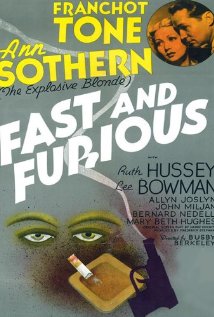
FAST AND FURIOUS
US, 1939, 72 minutes, Black and white.
Franchot Tone, Ann Sothern, Ruth Hussey, Lee Bowman, Allyn Joslyn, Mary Beth Hughes.
Directed by Busby Berkely.
Fast and Furious moves at a rapid pace. it is a story of a husband and wife who work together, she manipulating him to have a holiday during a very hot summer in New York City, he lending money to a friend without her knowing, the friend organising a beauty pageant in Florida and inviting him to come down to the pageant for a holiday. He then includes him in the list of judges – much to the annoyance of his wife.
There are the various scenes for the beauty pageant, under the direction of Busby Berkely, best known for his elaborate musical numbers. There are also some financial shenanigans. The young man, Lee Bowman, who has been lent the money is being targeted by an entrepreneur who, with the help of his financial adviser, a severe woman, Ruth Hussey, is planning to take off with the money. There is a complication with his relationship with one of the showgirls, Mary Beth Hughes. Also in the act is a journalist, Allyn Joslyn, who had a relationship with the showgirl – and, while charming on the surface and friend of the hero, he is nevertheless revealed as the killer.
Franchit Tone enjoys himself as the put-upon hero, indulging in little ogling, while devoted to his wife, trying to detect the killer. In the meantime, his wife, Ann Sothern, does a little detective work herself. One of the corny complications is that there is a circus master who has three lions in his room, wants to get some financial backing – and there are various scenes with characters confronted by the lions, with some none too convincing mugging Tone, wide eyes in fear of the lions…
Perhaps executives at MGM hoped that this might lead to a series, lower-grade Thin Man stories – although Ann Sothern did get her series with the adventures of Maisie.
Published in Movie Reviews
Published in
Movie Reviews
Tagged under
Saturday, 18 September 2021 19:57
Iris
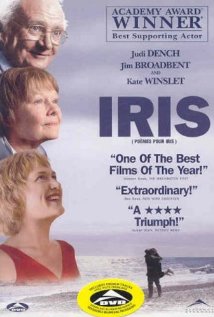
IRIS
UK, 2001, 91 minutes, Colour.
Judi Dench, Jim Broadbent, Kate Winslet, Hugh Bonneville, Eleanor Bron, Angela Morant, Penelope Wilton, Juliet Aubrey, Joan Bakewell, Kris Marshall, Samuel West.
Directed by Richard Eyre.
Dame Iris Murdoch was a novelist and a philosopher, one of the most acclaimed of 20th century British authors. However, her books have not been adapted for the screen. She was a lover of words and ideas rather than images. Her highest priority during her career was 'thought'. It now comes as something of a surprise to find her as the subject of a feature film - and so soon after her death.
However, it is not her ideas that are being dramatised here. There is some acknowledgement in the screenplay that she explored notions of freedom. There are some quotations from her lectures. At the end of the film, she declares that love is the most important thing in our lives, much more than reason which she admired so much. Although she declares that she does not believe in a God, she recites from Psalm 139 about the transcendent in our lives and about the presence of love.
Iris offers a number of interesting perspectives. There is the older Iris before she is lost in her Alzheimer's condition. There is the contrast with the young Iris, the seemingly intellectual flibertigibbert. But, there is no picture of the Iris in-between to help us understand how the younger grew and developed into the older. It is left to the audience to do what so many literature exam questions ask us to do, 'Compare and contrast'.
In this we are helped immeasurably by the fine performances. Kate Winslet appears as the younger, brash, free-spirited and free-wheeling Iris. She portrays her as uninhibited, especially in fleeting relationships, a woman of verve who is unexpectedly attracted to a stammering, balding young academic whom she eventually marries, John Bayley.
Judi Dench is Iris Murdoch. Long acknowledged as one of the finest of British stage actors, in recent years, Dame Judi has given us a number of screen performances that display her versatility. One thinks of her as Queen Victoria, 'Mrs Brown', as Queen Elizabeth I in her Oscar-winning role in Shakespeare in Love. She was in Chocolat and The Shipping News. She has shown another side of her skills as M in each of the Pierce Brosnan James Bond films. She is Lady Bracknell in The Importance of Being Earnest.
Judi Dench's ability to show Iris Murdoch as a tough-minded and committed writer and lecturer as well as portray her bewilderment at the gradual onset of the disease, her life at home, wandering and lost, and at a nursing home gives us a memorable and sympathetic experience of what ageing and illness are like for a person and those around them.
The other strength of the film is in the character of John Bayley. The screenplay is based on his memoirs, of his life with Iris Murdoch and of his love for her during her final years. Hugh Bonneville is convincing as the younger John and is made to resemble closely the older John, played by another extraordinarily versatile actor, Jim Broadbent (Topsy Turvy, Moulin Rouge, Bridget Jones's Diary). Broadbent won the Oscar for Best Supporting Actor. Bayley is seen as a shy man, rather swept off his feet by Iris, devoted to her and proud of her. He is also shown in desperate moments when he is at the end of his tether caring for his wife.
The initial impression of Iris in the film is that she is an intellectual. She delivers an after-dinner speech on the importance of freedom, a concept she has explored in her fiction and non-fiction writing. There is quite a deal of discussion about her respect for 'thought' and for language as the vehicle for thought. She is a woman of reason. She is a lover of words. Whatever type she might have identified with in real life, Iris Murdoch is being presented in the film as a strong thinking-function woman. Her speech is abstract, cerebral. As a writer of fiction she is also presented as more intuitive.
However, in the scenes that follow, where we see the young Iris, we might be led to believe that she is much more feeling, an outgoing flirt with both men and women. She is unembarrassed while swimming nude. She seems to be almost totally involved in the here and now.
Some reviewers have found difficulty in coming to terms with the film's portrait of Iris and this rather sweeping contrast between the young and the old. Perhaps they are saying that the two parts seem so inconsistent that we really are not given an interpretation of Iris that makes sense. The gap is too large. We need to see something of Iris in the intervening years.
In reply, the writers might say that they indicated the continuity in her life and character in more subtle ways, that the real Iris was always the thoughtful and imaginative woman under the young and flighty surface. After all, she had already written her first novel. She was already talking about concepts of freedom. And, despite her many friends and partners, she was always attracted to the bumbling John, saw a solidity and security in him that led her to commit herself to a lifetime with him.
Finally, as in the Ron Howard's film about Nobel prizewinning schizophrenic mathematician, John Nash, A Beautiful Mind, the intellectual comes to realise that completion is in the complementarity of thinking and feeling: the intellectual who values reason and the mind comes to learn the transcendent experience of the heart and love.
1. Audience interest in and knowledge of Iris Murdoch? As an academic, philosopher? As a novelist, her ideas, interest in thinking, issues of freedom, transcendence? Her life, career, her marriage, Alzheimer’s, the city, homes, the work world of academia, socials? Oxford over the decades? The musical score?
2. The structure of the film: establishing the older years of the characters, moving back, the young characters – and the interconnections?
3. The focus on Iris, young, wild, her character, relationships and affairs, friendship with Janet and Maurices? With John Bayley? Her potential – but no real indication of what she was to become? A personable but puzzling character?
4. John Bayley as younger, Oxford, Iris? His marrying her? The older John, the deterioration of his wife, his support of her, the Alzheimer’s, the effect on him, the detail of his care?
5. Janet and Maurice, young, friendships, relationships? Later?
6. Iris as older, authoritative, her reputation, her novels and their impact, her emphasis on thinking, the value of thought, recent, abstraction? Freedom, not believing in God but reciting the psalm? Transcendence? Her own behaviour, uninhibited, relationships, the nude swimming, discussions and arguments?
7. Iris and the media, interviews, BBC, personnel?
8. The onset of the onset of Alzheimer’s, the effect on Iris, her deterioration physically, mentally, the nursing home? Her dependence on John? Leading to her death? And the picture of care, Love infidelity on the part of John?
Published in Movie Reviews
Published in
Movie Reviews
Tagged under